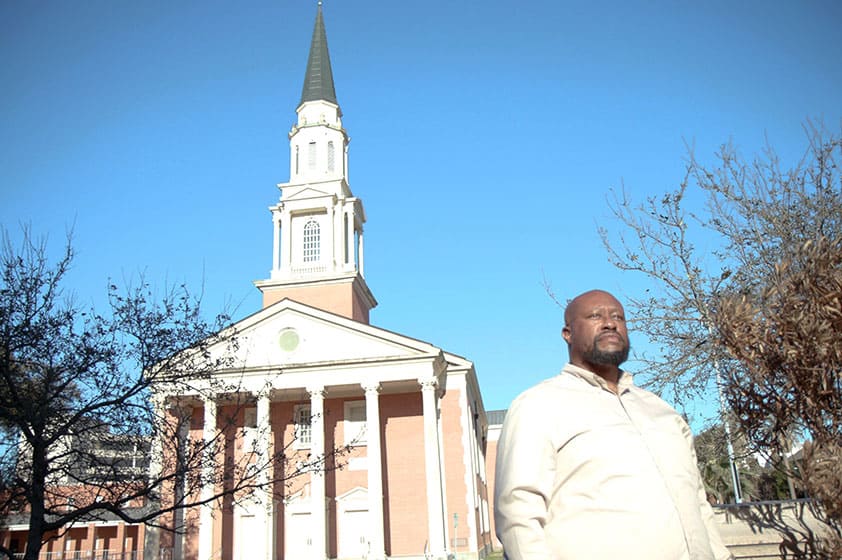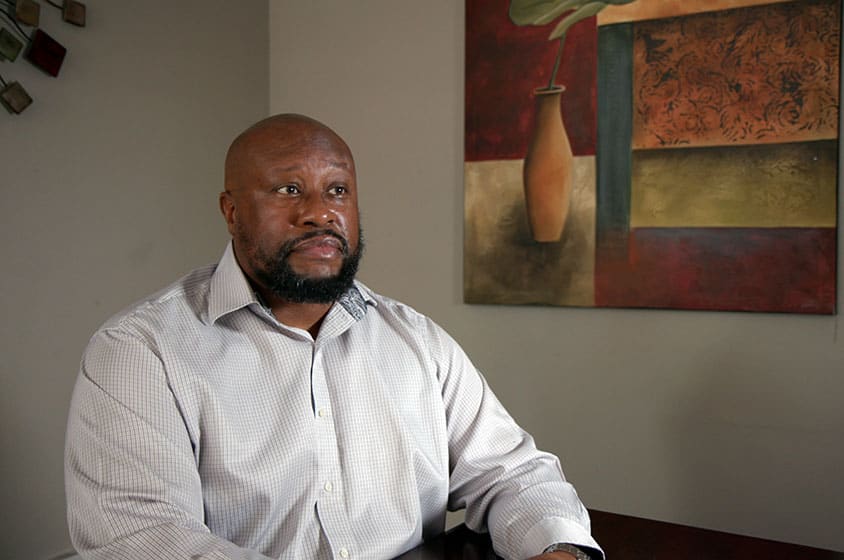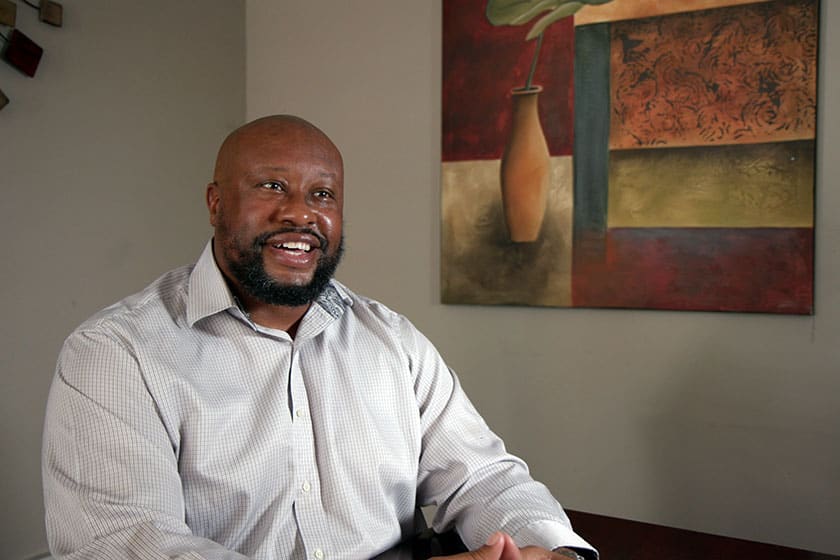-
A GO-GETTER'S SECOND CHANCE AT SUCCESS
How a Young Achiever Went from Living Reckless to Living Free
It's almost amusing to picture Damion Walker as a rambunctious middle schooler. Now in his 40s, sitting at a table to tell his backstory, he looks ready to go to the office—trimmed beard, pressed button-up shirt. Still, he hasn't lost the sunny demeanor that made him a fun kid.
Growing up in Texas, Damion liked being the center of attention. He considered himself "the class clown." While he had plenty of fun, Damion never wanted to make trouble and often took advanced classes in school. He moved around a lot, sometimes living with grandparents, always learning to adapt to new crowds in order to make friends. When his family settled in southwest Houston, 11-year-old Damion started hanging out with older teens.
Before long, he found out these kids sold crack, which had become especially prevalent in marginalized communities of color like Damion's. He first held crack in his hand in the fifth grade. By the end of seventh, he was selling the drug for extra cash to help his family, but Damion was still getting good grades and playing football. He dreamed of going pro someday.
He thought his future lay in running down a football field—not running from the law. But things wouldn't work out like Damion planned.

He thought his future lay in running down a football field—not running from the law. But things wouldn't work out like Damion planned.
SURVIVAL MODE
Damion wasn't even wearing shoes the first time he sat in the back of a police car, after jumping a guy who attacked his brother. The officers drove Damion a few blocks away, reprimanded him, and let him go. The young teen walked home barefoot.
At his next run-in with police, 15-year-old Damion was flooring the gas pedal in a high-speed car chase. His friend had stolen the car the day before, but now Damion was behind the wheel. The police weren't far behind them. Damion crashed the car into an apartment building and ran away on foot. He stopped somewhere in the woods and had an asthma attack, and when police found him, he was lying on the ground.
That night, Damion ended up in the juvenile detention center and went home with 11 felony charges to his name. The next morning, he showed up in class to give a graded presentation, mouth still swollen from the car crash. Classmates snickered at his appearance, but he got an A on the report.
Damion made money dealing drugs, but life on the streets only led to more arrests and violence. By age 16, Damion was certified to stand trial as an adult and faced decades in prison for aggravated robbery, among other charges. It was a cold December day when he stepped into his first adult facility. Hours after Damion arrived, a gang member showed him how to handle a shank in one hand and punch with the other.
In some ways, the streets had mentally prepared Damion for prison. But, still a teenager, he was barely on the cusp of adulthood and surrounded by grown men.
"I had to survive," Damion says. "I had to make it out."
Damion began working as a janitor. Part of his job involved cleaning the maximum-security unit, where he continually feared the threat of violence. The very atmosphere "was too much for me to understand and bear," he says. He started skipping work to avoid the risks.

'I had to survive. I had to make it out.'
A GOOD CITIZEN
As Damion struggled under the heaviness of prison life, visiting volunteers became a welcome presence. They often came from local churches just to spend time with prisoners. This boosted Damion's morale and gave him a sense of hope.
"[Around] age 21, I just got on a path of, 'Let's see if I'm going to make it out of here,'" Damion says.
Damion had completed his GED and started college courses behind bars. While he was at Central Unit, he also began to grow and develop as a man of faith. He was mentored by other incarcerated men and even began to mentor others in their own journeys.
Damion knew that he would need additional preparation for his return to society. When he found out about the Prison Fellowship Academy®, an intensive, voluntary program at the Carol S. Vance Unit in Richmond, Texas, he was intrigued.
The Academy helps replace participants' criminal mindset and behaviors with renewed purpose and life principles. With targeted curriculum and compassionate coaches, the Academy fosters a restorative community and leads people to become good citizens in prison and beyond.
Damion was 31 when he arrived at the Vance Unit and joined the Academy. While the Academy is not technically a reentry program, Damion says it prepared him to go home. The Academy helped him embrace biblical values like integrity, responsibility, and restoration. Damion learned to process his trauma and correct the attitudes and habits that contributed to his criminal behavior.
There, Damion met role models like Darryl Brooks, the Academy graduate-turned-program director. In prison, Darryl turned his life over to Jesus Christ and enrolled in the Academy. Today, he helps other men acquire the same tools that helped him succeed.
While Damion was at Central Unit, he also began to grow and develop as a man of faith. He was mentored by other incarcerated men and even began to mentor others in their own journeys.
THE PATH TO RESTORATION
Darryl and other program staff showed Damion his true potential to be a good neighbor and a leader. Other participants and previous Academy graduates inspired Damion to stay on track with the program, and soon, he was mentoring and serving others inside the walls.
"They told me, 'Damion, you need to stay involved, because if you want to prepare for going home, these things are going to prepare you,'" Damion says.
Damion's life didn't change overnight. But over the course of 18 months, he learned to pursue and develop healthy relationships, wholesome habits, coping skills, and other things necessary for a successful life. The biblical core values of the Academy also helped Damion to develop his faith in God more deeply than he had before.
When Damion helped in the prison chapel, his faith and his love for church grew. He spent time studying the Bible, fasting and praying, and connecting with other Christians. "I learned about God through service," he says.

While Damion was at Central Unit, he also began to grow and develop as a man of faith. He was mentored by other incarcerated men and even began to mentor others in their own journeys.
WALKING IN FREEDOM
Damion walked free from prison with an Academy certificate, an associate degree, and a GPS monitor to wear at all times. And while his new freedom brought joy, he had no home to return to. His mother and grandparents had passed away during his incarceration. Damion settled into a halfway house in Houston.
Damion considered himself lucky from the start of his reentry journey. It’s one thing to have charisma and drive; it's another thing to face a world filled with obstacles to reentry. The barriers Damion faced, known as collateral consequences, keep the tens of millions of Americans with a criminal record from reaching their full potential.
Despite the stigma of being formerly incarcerated, Damion had someone walking alongside him every step of the way. His mentor, Marlon, helped him apply to the University of Houston to complete his bachelor's degree in broadcast journalism. Another person set him up with a job interview to be a client service professional at H&R Block. Damion got the position and attended university classes full-time.
Damion thrived because he had both a solid work ethic and a supportive network of people who wanted him to succeed. Once he graduated college, he found a job selling cars. Becoming a legitimate, successful car salesman was no small feat for a man with a record for car theft.
Soon Damion took an interest in the nonprofit sector and began volunteering with nonprofit programs, such as a resume class hosted by the city of Houston. Before long, Damion was doing outreach for one of the largest workforce development nonprofits in the city, connecting with the district attorney's office, the Houston Police Department, the Harris County Sheriff's Office, and local school districts. Once a contributor to crime in his community, Damion is a part of the solution today.
"I started being able to lend my voice because I had lived experience," says Damion.
Once a contributor to crime in his community, Damion is a part of the solution today. 'I started being able to lend my voice because I had lived experience.'
GIVING BACK, MOVING FORWARD
Using his degree in communications, Damion started working in radio. On the air, he asks formerly incarcerated men and women to share their stories. Many of these guests are successful businessowners, lawyers, and even comedians. All of them have a chance to answer one of Damion's favorite questions: How are you giving back to your community?
Damion says his second chance is what allows him to give back in his own way—to redeem his future for good. And he adds,
A second chance is important because [people] have to be able to reestablish themselves in society. They have to feel like a citizen. People talk about being a second-class citizen. You have to feel like a citizen—being able to reestablish yourself not only as a person, with your family, with your community, with your city. It makes the city, the county, the community better because now you have someone who can contribute and feel good about contributing.
Today Damion lives in Houston with his dog Cassius and enjoys being a part of Sagemont Church. He was recently hired as a peer navigator with the Holistic Services division of the Harris County Public Defender's Office. He serves as a liaison between the defendant, the court, and the family—working within the same court system that once held him in custody. And every day he wakes up thankful to be living free.
If I hadn't been given a second chance, I don't know where I would be.
'If I hadn't been given a second chance, I don't know where I would be.'